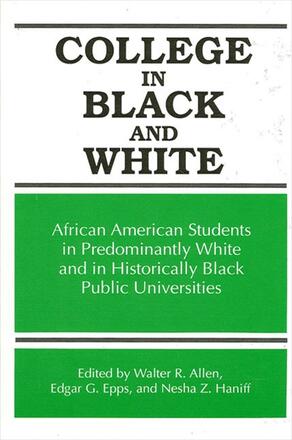
College in Black and White
African American Students in Predominantly White and in Historically Black Public Universities
Alternative formats available from:
Description
This book reports findings from the National Study of Black College Students, a comprehensive study of Black college students' characteristics, experiences, and achievements as related to student background, institutional context, and interpersonal relationships. Over 4,000 undergraduates and graduate/professional students on sixteen campuses (eight historically Black and eight predominantly White) participated in this mail survey. Using these and other data, this book systematically examines the current state of Black students in U. S. higher education. Until now, our understanding has been limited by inadequate data, misguided theories, and failure to properly interpret the Black American reality. This volume challenges our assumptions and contributes to the growing body of knowledge about Black student experiences and outcomes in higher education.
Walter R. Allen is Professor of Sociology at UCLA. Edgar G. Epps is Professor in the Department of Education at the University of Chicago. Nesha Z. Haniff is Assistant Professor in the Center for Afro-American and African Studies and Lecturer in the Women's Studies Program at the University of Michigan.
Reviews
"The National Study of Black College Students (NSBCS) is the most comprehensive data base on Black college students that has been collected. This book presents in one volume several major studies using this rich data base and ties them together with a theoretical and methodological overview. Its strength lies in its comprehensiveness, its impressive richness of data, and its keen insights into the differences between Black students' experiences and those of their non-Black peers on college campuses. "--Reginald Wilson, Ph. D., Senior Scholar, American Council on Education, Washington, DC
"This impressive book successfully brings together sound, empirical research to test a number of assumptions about the experiences of Black students in higher education. Each chapter is methodologically sophisticated and moves beyond descriptive statistics to intensive statistical analyses of a plethora of data. " -- James E. Blackwell, University of Massachusetts, Boston